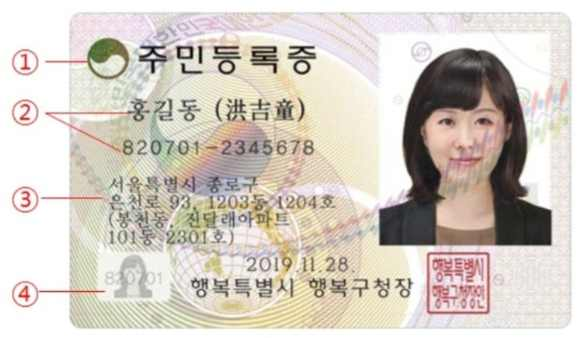Given names in Korea often look very much alike. Combine this with the fact that many Koreans share the same family name, and the result is that you are likely to encounter Koreans with identical names.
However, there are ways to tell them apart.
Let’s take a look at Korean names – how are they given and what do they mean?
1. Koreans Have Two Names?
Let’s start by looking at how Korean names are written.
The vast majority of Koreans (over 99%) write their names in both Hangul (Korean characters) and Hanja (Chinese characters), and both variants are found on ID cards.
Nowadays, given names that are written in Hangul only are getting more popular, but they are still rare, and you still find Chinese characters in the family name.

Interestingly, when Korean artists appear for the first time in Chinese media, their names are often written with incorrect characters. In China, where only Chinese characters are used, they try to guess the right Hanja based on the pronunciation, but there are many possible options.

For example, the members of ITZY initially only released their names in Hangul and the Latin alphabet. Their names in Chinese would later be changed:
Yeji: 藝智 → 禮志 (예지)
Ruijin: 柳真 → 留真 (류진)
Chaeryeong: 彩鈴 → 彩領 (채령)
Yuna: 俞娜 → 有娜 (유나)
If you're a fan of Hallyu stars, you probably know that you often end up finding more than one Korean artist with the same hashtag on Instagram or other social media.
This is because although artists may write their names with different Chinese characters, the Hangul spelling is the same,
2. Same Name In Hangul, But Different Characters
If you're a fan of Hallyu stars, you probably know that you often end up finding more than one Korean artist with the same hashtag on Instagram or other social media.
This is because although artists may write their names with different Chinese characters, the Hangul spelling is the same,

There can be a number of different Chinese characters corresponding to a Hangul character.
For example, ”진” (Jin) could be either of the characters 真, 珍, 晉, and 振. And among the possible Hanja for ”여” (Yeo), we find 呂, 黎, 汝 and more.
So even though Koreans pronounce their names the same way, they often write their names with different Chinese characters, which can be seen on ID cards.
The most famous example is 진영 (Jin-young), a name shared by members of GOT7 and B1A4 ,as well as the JYP Entertainment founder Park Jin-young.
The three all use different Chinese characters for their names. Needless to say, even Koreans get confused over who‘s who!
 |  |  |
In fact, not all Koreans know how to write the Chinese characters in their names, and they might not even know the meaning of them. Koreans need their Hanja names for identification purposes, but elsewhere they almost exclusively use their Hangul names.
3. Characters To Avoid For Korean Names
In most cases, Korean parents start out with picking a Hangul name for their children, based on the sound. They later refer to dictionaries to find Chinese characters that correspond to the Hangul.
This means that there are some characters that are rarely used in names.
For example, the sound 년 (nyeon) can be written as 年, the character for Year. No problem there.
However, the same 년 sound is also used in Korean as a degrading term for women. No wonder that 년 (nyeon) is rarely used in names! The similar sounding 녕 (nyeong) is also avoided when giving names.

The same goes for 놈 (nom), which is a degrading term for men (similar to bastard/punk). You never see this sound used in names. *Both nyon and nom are sometimes used in a joking or endearing manner between friends, but in other cases they are offensive terms that need to be avoided!
Another example of a sound that is often avoided is 사 (sa); depending on which Chinese character you use, it can mean death, murder, snake and other ominous things.
4. Not Korean But Want A Korean Name?
If you're from China, creating your Korean name is a piece of cake. Just like Korean names, most Chinese names consist of three Chinese characters. Apply the Korean reading to these characters, and - there you go - you have a Korean name!

But some choose their Korean name based on sound rather than Chinese characters.
For example, TWICE member Tzuyu’s Taiwanese name is written as 子瑜. A Korean reading of these characters gives you 자유 (Jayu), which means "freedom" in Korean. Instead of being called Freedom, she chose to emphasize the original Taiwanese pronunciation of her name instead, namely Tzuyu ( 쯔위 in Korean).

Most Japanese names are also written with Chinese characters, but giving these characters Korean readings can give weird-sounding results. Instead, many just transcribe the pronunciation of their names to Hangul. One example is IZ*ONE member Miyawaki Sakura (in Chinese characters: 宮脇咲良), who transcribes her name as 미야와키 사쿠라 in Korean - in other words Mi-ya-wa-ki Sa-ku-ra.
Most foreigners choose to transcribe their names into Korean based on the Latin alphabet, just like Miyawaki Sakura.
Only if you're from a country that uses Chinese characters, you get the luxury to choose between the Korean reading of your characters or a transcription of the pronunciation of your name.
If you don't have a Korean name yet, get one by trying out our Korean name generator!
5. Unique Korean Names
Most Korean full names consist of three characters, but there are also some with two or four characters.

박 새로이
Park Sae-ro-yi
A law passed in 1993 states that names in Korea, excluding the family name, must not exceed 5 characters.
There are cases of family names with two characters, which means that the longest possible name is 2 + 5 = 7 characters long.
Some other regulations:
- You are not allowed to mix Hangul and Chinese characters
- You cannot give a name identical to one of the parents'
- You have to choose between a specified list of Chinese characters (8000 characters to choose between!)
Among family names with two characters, we can find Dongbang (東側/동방), Namgung (南宮/남궁), Seomun (西門/서문) and Sun-woo (鮮于/선우).
 |  |
Korean often give their children names with a specific meaning.
For example, the Ha-neul in Kang Ha-neul means heaven in Korean, and the Na-ra in Oh Na-ra means country.
6. The Most Popular Names In Korea
Boys | Girls |
서준 Seo-jun 敘俊、書俊 | 지안 Ji-an 智安、知安 |
하준 Ha-jun 河俊 | 하윤 Ha-yoon 河允 |
도윤 Do-yoon 道允、道尹 | 서아 Seo-ah 敘兒、序雅 |
시우 Si-woo 時宇、始友 | 하은 Ha-eun 河銀、河恩 |
은우 Eun-woo 銀優、恩友 | 서윤 Seo-yoon 序允、書允 |
지호 Ji-ho 智浩、知浩 | 하린 Ha-rin 河琳 |
이준 Lee-jun 里俊、利俊 | 지우 Ji-woo 知宇、知友 |
예준 Ye-jun 禮俊 | 아린 Ah-rin 雅琳 |
Top 5 most popular names in Korea were the same in 2019 and 2020!
Among boys, the rise of the artists Park Seo-joon and Cha Eun-woo seem to have driven the popularity of the names Seo-jun and Eun-woo.
Among girls, it seems like more classic and neutral names are the names of the game.
The easiest way to tell if a Korean name is male of female is actually to look at the Chinese characters (not the easiest task, we know!).
Korean parents often try to give soft and gentle-looking characters to their daughters (again, they don’t always know the exact meaning of the characters). For boys, on the other hand, 준 (Jun or Joon) appears frequently. The corresponding Chinese characters for the sound, 俊 (outstanding) and 準 (standards/accurate), give a more strong image.
If you have questions or comments about the blog post, pleave leave a comment below or email us at help@creatrip.com




